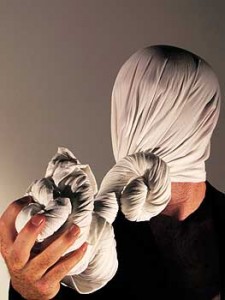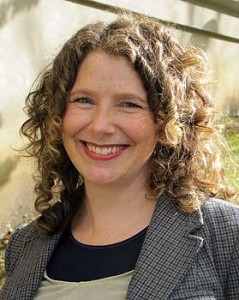Amanimal– Knothead, a character from Amanimal played by Paul Young; and Dr Emma Willis.
Worlds of man, beast and bird explored in theatre
The boundaries and bonds between humans, animals and their environments are explored in an inventive new dance theatre show, Amanimal, created by Massey University lecturer in theatre Dr Emma Willis. She devised the work with noted choreographer Malia Johnston. Amanimal opens this week at Q Theatre as part of Auckland’s Fringe Festival.
It features three men: dancers Ross McCormack and Paul Young, and musician Eden Mulholland, who explore themes of survival, change and transformation through movement, text, song and image. The performers inhabit different forms – from birds, to men, to strange creatures – as they negotiate an ever-changing landscape, says Dr Willis, who teaches in the School of English and Media Studies at the Wellington campus. Describing the world of the work as “richly infused with comedy and absurdity and well as lyrical imagery,” she says the environment is central to the work and is looked at from multiple angles.
“I wanted to build tension within the scenes and sequences by focusing on how beings create and reflect their environment.”
“The work also looks at the point at which two things merge, becoming one before separating and evolving into something different again. ‘You’ and ‘I’ are uncertain, interchangeable and fraught. Over and over the performers have to find ways of being together, of jointly inhabiting and negotiating the unsteady topography,” she says.
Amanimal is running as a doublebill with Terrain – the works share the same designer John Verryt, and choreographer Malia Johnston – from February 26 to March 2.
Willis and Johnston’s previous work, Body/Fight/Time was performed at newly built Q Theatre in Auckland in October 2011. New Zealand Herald reviewer Raewyn Whyte wrote, ‘[Body/Fight/Time] is a fully integrated whole, with highly memorable mood-setting songs, compelling video portraits and sequences which interweave seamlessly with the dancing. Dark Tourists, their first collaboration, won the Wellington Fringe Festival Best Dance award in 2008. Dr Willis has previously devised, scripted and directed a number of new New Zealand plays in Auckland and Wellington, including The Swimming Lessons and Never Never by Jackie van Beek; and Milk (Best Theatre Work 1998 Wellington Fringe Festival), Flood (Most Original Production 2000 Chapman Tripp Theatre Awards), Fever and A Perfect Plan (nominated for three awards at the 2002 Chapman Tripp Awards).
She has also written and directed two radio plays for Radio New Zealand, The Fat Man (adaptation of a Maurice Gee novel) 2003; and Milk, completed in 2005.
She is currently working on a monograph for Palgrave Macmillan, Absent Others: theatricality, dark tourism and ethical spectatorship, which is to be published in 2014.

